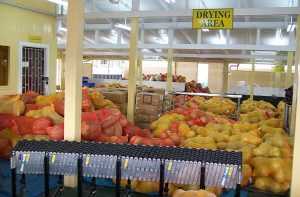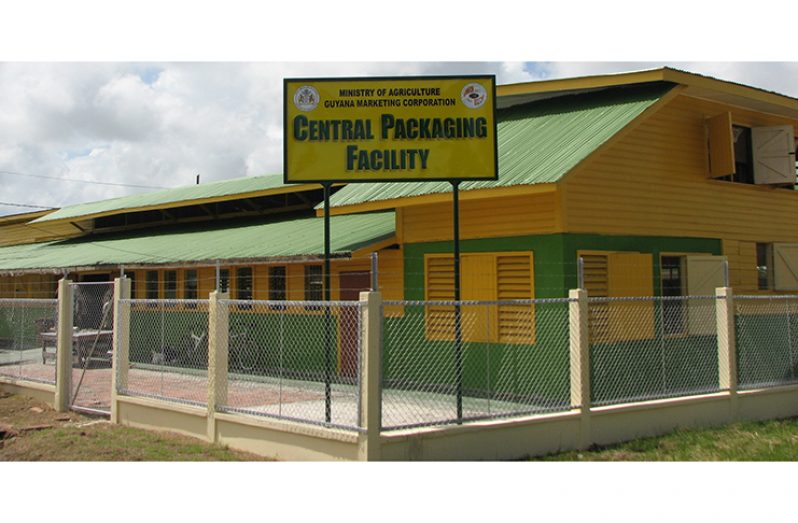RECORD levels of increase in the quantity of non-traditional agricultural commodities have been processed at the Guyana Marketing Corporation (GMC) facilities for export to countries such as Antigua, Barbados, St. Kitts, St. Maarten,
Trinidad and Tobago, Canada and the United States of America (USA).
The Central Packaging Facility in Sophia and the Parika Agro-processing Packaging Facility continue to be used for the preparation of the commodities for export.

The GMC stated that so far that for the period January to August 2018, their facilities have processed “over 809 metric tonnes of non-traditional agricultural commodities… for export.” This, it states, represents an 18 per cent increase in exports when compared to the corresponding period of January to August 2017.
Further, the GMC noted, “A total of 56 shipments were processed, 46 were for exports via sea and 10 were for export via air.”
GMC’s General Manager, Ida Sealey-Adams noted that while the increase is commendable, there is a need for exporters of non-traditional agricultural commodities to take advantage of the two facilities available to them. She added that GMC is also looking at other services that can be targeted at the facilities such as the processing and packaging of fresh produce to target local supermarkets and export markets.
Coming from various parts of the country, the Central Packaging Facility of the GMC ensured that products such as crushed peppers, pepper sauce, steamed and curried katahar, cut green mangoes, steamed bilimbi, mango achar, preserved carambola fruits, coconut oil and cassava cassareep were being properly prepared for bulk shipment. Cassareep, honey and Chinese sauce were also included in the preparation for export.
Adams pointed out that even with the increase in export from the packaging facilities many exporters still find it difficult to acquire the quantity and quality of produce that is required to satisfy the demand of the export market at a competitive price.
Packaging Facilities Manager of the GMC, Celestine Butters, noted that unfavourable weather conditions contributed to the shortage of produce, especially in the Pomeroon and Berbice areas.
At the same time, she stated that “there is a growing export demand for produce such as watermelons, plantains, seedless limes, pumpkins and dried coconuts.”
FORMS OF TRANSPORTATION

Further, it was posited that apart from the difficulties with the acquisition of the desired quality and quantity of produce for shipment and the unfavourable weather condition, the issue is compounded by the fact that air shipments, especially to Barbados, have become inadequate since the change of ownership and route of AMERJET. This has resulted in the company no longer offering its services to Barbados exporters.
According to Butters, cargo shipments are also offered by Caribbean Airlines and Fly Jamaica. However, it was noted that space is usually limited since the luggage of passengers are usually given first preference. However, notwithstanding the difficulties with regards to transportation, the Guyana Marketing Corporation is very thankful to the air cargo and sea freight cargo service providers who have consistently availed their services to the exporters, she stated.
As the corporation continues to engage with other service providers to expand the availability of transportation service for agricultural commodities, efforts are continuously being made to encourage service providers outside of Guyana to offer their services to local exporters, especially at routes that are not currently being serviced, Adams offered.
She urged farmers to utilise the packaging facilities much more, even as she also noted that there has been a noticeable increase in the utilisation of the facilities so far for the processing of agricultural commodities for export.
Adams said that efforts are being made to continue to upgrade the facilities, stating, “Plans are in place to undertake semi-processing of agricultural commodities in sections of the facilities to target both local and export markets. This service will soon be made available for use by other stakeholders.”
She went on to state that over the years the GMC, through its Central and Parika Packaging Facilities, has been making it easier for exporters of fruits and vegetables and other non-traditional commodities. The Central Packaging Facility and Parika Agro-Packaging Facility facilitate the processing of fresh fruits and vegetables to export markets.
BILATERAL AGREEMENTS
In fact, she noted that there is a bilateral protocol arrangement between the Guyana Marketing Corporation and the respective Ministries of Agriculture in Barbados, Antigua, Trinidad and Tobago and St. Lucia.

These facilities were established to ensure traceability and correct monitoring of fruits and vegetables being exported from Guyana. They are furnished with equipment that can be used for washing, drying, sanitising and cooling of commodities. The corporation, through these facilities also provides refrigerated cold storage, refrigerated trucking service and the rental of agricultural crates for its stakeholders.
Meanwhile, for farmers to be able to export fruits, vegetables and other agricultural commodities, they must observe some general conditions. Among these conditions are that farmers must be registered and operate in pest free zones and at the same time their products presented for export must originate from Guyana; that the packaging must be done under approved farming conditions, for example, there should be proper drainage and irrigation; as well as proper sanitary facilities.
Additionally, there must be proper management of the crops from the initial stage until harvesting the commodities that are intended for the export market. These commodities are expected to be certified and stamped by the relevant officials in Guyana so as to ensure the integrity of the products for export.












